“I would not want to be president and would not vote for a woman president. A woman cannot reasonably want to be a commander-in-chief. I prefer to answer the question by outlining what a rational man would do if he were president.”
That was Ayn Rand’s answer to an article-interview question that asked her and 15 other prominent women in 1968 about what they would do if they were President of the United States (U.S.).
Ayn Rand moved from Russia to the U.S. in 1926. She was the founder Objectivism – a philosophy that integrated reason and logic as the cognitive tools necessary for understanding the world, rational selfishness as the basis for ethics, individual rights and laissez-faire capitalism as the most moral and humanly beneficial approach to politics, and romantic realism as the type of art best suited to fuel man’s need to survive.
Rand is perhaps best known for her novels, The Fountainhead (1943) and Atlas Shrugged (1957), but she also authored numerous works of non-fiction, including a 1969 essay titled, “About a Woman President.” The essay was later published as part of a small collection of Rand’s writing called, The Voice of Reason.
Rand said many things over her career that were misunderstood and mischaracterized. Her essay on a woman president is one example. In fact, in her opening remarks in her essay, Rand said that she decided to write it because she received letters from students of Objectivism, who wanted her to clarify her answer from the1968 article-interview.
Other than when Hillary Clinton ran for the office of U.S. President in 2016, the topic of a woman president has never been more relevant. In the coming weeks, most U.S. voters will choose between two candidates for the country’s highest and most important office: former president Donald Trump and current Vice President Kamala Harris.
Here, we will revisit Rand’s 1969 essay to clarify her views on a woman president.
Rand said that she would not want to be president and that she would not vote for a woman president. However, Rand’s view was not based on a belief that women are inferior to men or that a woman could not do the job.
“It is not an issue of feminine ‘inferiority,’ intellectually or morally; women are not inferior to men in ability or intelligence; besides, it would not take much to do a better job than some our recent presidents have done.”
Instead, Rand’s view was based on what she believed to be the basic psychological need of rational women – “hero worship.”
“I do not think that a rational woman can want to be president. Observe that I did not say she would be unable to do the job; I said that she could not want it. It is not a matter of her ability, but of her values…The issue is primarily psychological. It involves a woman’s fundamental view of life, of herself and of her basic values. For a woman qua woman, the essence of femininity is hero worship – the desire to look up to man. ‘To look up’ does not mean dependence, obedience or anything implying inferiority. It means an intense kind of admiration…the object of her hero worship is specifically his masculinity…”
The specific nature of the duties of U.S. president were integral to Rand’s view. Rand believed that serving as the country’s highest authority and as commander-in-chief of the military would be a psychological nightmare for a woman qua woman.
“This, for a rational woman, would be an unbearable situation…To act as the superior, the leader, virtually the ruler of all the men she deals with, would be an excruciating psychological torture. It would require a total depersonalization, an utter selflessness, and an incommunicable loneliness; she would have to supress (or repress) every personal aspect of her own character and attitude; she could not be herself, i.e., a woman.”
Rand then projected what she believed would become of a woman exposed to this inner torture:
“By the nature of her duties and daily activities, she would become the most unfeminine, sexless, metaphysically inappropriate, and rationally revolting figure of all: a matriarch.”
Some readers might interpret Rand’s position as implying that a woman should not want to hold any leadership roles. However, this was not Rand’s belief. Rand was clear that her view was specific to the job of U.S president. Her view was based on the specific nature of that job and the psychological harm that she believed carrying out that job’s daily activities would do to a woman qua woman.
Rand was not a sexist. She was not against impressive women. She was an impressive woman herself, and she depicted impressive women in her novels. In fact, at the beginning of her 1969 essay, Rand mentioned that she thought her earlier comments would have been understood based on the female characters that she depicted in her novels – for example, Dagny Taggart, who, in Atlas Shrugged, was Vice President in Charge of Operation at Taggart Transcontinental.
For Rand, a key difference between the position of country president and other leadership roles was that the president is superior to all individuals he interacts with, whereas a business leader continually deals with people who are not inferiors but instead are customers, suppliers, competitors, and so on.
“Women may properly rise as high as their ability and ambition will carry them; in politics, they may reach the ranks of congresswomen, senators, judges, or any similar rank they choose. But when it comes to the post of president…do not ask, ‘Could she do the job and would it be good for the country?’ Conceivably, she could and it would – but what would it do to her?”
Rand conceded that there might be exceptions to voting for a woman president. Combinations of factors like laws, policies, natural disasters, pandemics, wars, and assassinations can all potentially impact the pool of individuals who are available as political candidates at a given time. Rand recognized such possibilities, and she stated that there might be certain historical contexts or national emergencies when a woman might temporarily assume the role of president if there were no men willing or able to assume the position. Here, however, Rand posited a rhetorical question that has much contemporary relevance:
“But what would this imply about the character of the men at that time?”
Rand then referenced the U.S. founding fathers – a group of men who were broadly virtuous, brilliant, and talented, and led the country when circumstance required it:
“Normally, the best and ablest among men do not necessarily have to seek the presidency, but in an extreme emergency, they would have to – as did the founding fathers.”
Phil Donahue Show in 1979
Confusion about Rand’s position on a woman president was not limited to the students of Objectivism who read her 1968 article-interview. In 1979, 10 years after Rand wrote her follow-up essay, she appeared on the Phil Donahue Show. During the question-and-answer period, a woman in the audience, who presumably had never read Rand’s essay, asked Rand how she would feel about a woman being the head of the White House one day.
Rand responded bluntly, “I wouldn’t vote for her.”
A combination of shock and laughter rained down from the audience. Rand’s reply had been so quick and assertive that audience members were left cognitively scrambling, trying to make sense of what they had just heard: “Did she really just say that in this era of women’s empowerment?”
Donahue, who laughed at Rand’s response in a friendly way, asked her to clarify her position. Rand, perhaps knowing that she would not have enough time to fully explain her position, answered by encouraging the audience to read her 1969 essay. But moments later, a second woman in the audience asked Rand a more specific and hypothetical question. The woman asked Rand if she would you still not vote for a woman president even if the female candidate was better qualified than the male candidate?
To Rand’s detriment, she paused before answering. Her hesitation made her seem somewhat naïve, as if she had never contemplated such a question before. However, we know from Rand’s 1969 essay that she had already considered such scenarios.
Rand eventually answered the woman’s question by stating that if society had fallen so low as to not have a male candidate who was better qualified than a female candidate then she might consider voting for the female candidate.
Rand’s response caused the woman in the audience to accuse Rand of holding low views of women. Rand knew that she did not hold low views of women, and she knew that the audience, just like the students who sent her letters in the late 1960s, did not understand the nuance of her position.
Rand then clarified to the audience that she believed it was not in a woman’s “personal interest to rule man” and that doing so would put a woman in an unhappy position. Rand then stated that she did not think that “any good woman would want that position.”
Again, Rand’s comments were met with shrills and shrieks from the audience. Donahue then followed up. He asked Rand if she was against women in leadership positions. With a commercial break looming, Rand quickly stated, as she had 10 years earlier, that she was not against women in leadership positions and that she would vote for women in other offices. But a woman as commander-in-chief of the military, Rand concluded was “unspeakable.”
Contemporary Political Views
Now, 55 years after publication of Rand’s essay, and 45 years after her appearance on the Phil Donahue Show, we find ourselves considering, for only the second time in U.S. history, the possibility of electing a woman to the nation’s highest office. Rand’s view on a woman president, albeit misunderstood, was controversial in the 1960s and 1970s. This then begs the question of what people today might think of Rand’s view? Moreover, how do Rand’s views on the idea of a woman president fit within or outside of contemporary political beliefs and the current presidential race.
In 2023, the Pew Research Center, conducted a poll on woman and political leadership in the U.S.. The poll revealed that Americans hold mixed views on the idea of a woman president. A total of 18% of survey respondents said that it would be very or extremely important to them if a woman was elected U.S. president in their lifetime.
The poll also revealed that views on the topic correlate with voter sex and political affiliation. Democrat women were the most supportive and enthusiastic of the idea of a woman president, whereas Republican men were the most sceptical about the importance of having a woman president. A poll conducted by the Survey Center on American Life similarly showed that a greater percentage of women than men said that a woman being elected U.S. president would be very important historically.
Such polls indicate that many women, particularly Democrat woman, support the idea of a woman president. Kamala Harris’ current candidacy is evidence that these respondents are willing to put their beliefs into action…. sort of.
Surveys like the one from the Pew Research Center do not ask respondents whether they would want to be president. If such a survey was conducted, it would likely show that the average woman is less likely to respond that she would want to be president than the average man would respond that he would want to be president.
Such a result would partly support Rand’s conclusion about examining the topic from the standpoint of self-interest and personal psychology. It would show that many women support the idea of a woman president at an abstract or symbolic level; but when applied to themselves, many women would say no, just as Ayn Rand said that she would not want to be president.
In fact, a fundamental aspect of Rand’s position that gets overlooked is that it is empathetic toward women. Rand told readers not to think about the topic in terms of whether a woman president would be best for a country. Instead, she was concerned about the impact that serving in such a role would have on a woman’s psychology. Rand envisioned that a rational woman would be miserable serving as president, with her apparent need for “hero worship” continually unmet. This view need not be controversial. For example, studies in the field of sexual health consistently show that women are much more likely than men to express a preference for being submissive during the sex act and that women fantasize about being submissive more than men do. Such results qua preferences then suggest that a woman would be unhappy and unable to optimize her psychological health if continually dominating men in her post as president.
To the extent that a survey might show a disconnect between a woman’s preference for herself and for other women regarding serving as country president, this would then seem to show that Ayn Rand was one step ahead of most women’s own introspective abilities. Rand did not believe in sacrificing one’s life for the “greater good,” and she apparently also did not believe that a woman should sacrifice her own personal need for masculine reciprocation to the state.
Kamala Harris and the 2024 Masculinity Election
Finally, we come to Kamala Harris and the 2024 election.
What would Ayn Rand think of Kamala Harris as a presidential candidate?
Kamala Harris is a woman. Therefore, Rand’s position on a woman president applies to Harris. As articulated in her 1969 essay and her 1979 interview, Rand believed that no rational woman could want to be president. Moreover, Rand concluded that if the woman being considered for the role was not rational, then she is “unfit for the presidency or for any important position, anyway.” Put another way, Rand believed that, under most circumstances, only an irrational woman would want to be president.
Ayn Rand and Kamala Harris share little in common when it comes to political philosophy. Rand despised collectivism in all its political forms. Harris embraces socialism (what she calls “equity”) and was labelled one the most “progressive” members of Congress during her tenure as U.S. senator.
Rand epitomized rational, logical, and objective thinking. She knew multiple languages, constructed an entire integrated philosophy, and then spelled it all out clearly in her works of fiction and non-fiction. Kamala Harris has a severely limited vocabulary and a unique ability to scramble those few words into the most exceptionally vague and incoherent sentences that we have ever heard from a presidential candidate.
Rand focused on individual merit and achievement. Rand loathed tribal identities, such as those based on superficial characteristics like race. Harris seemingly embraces all aspects of the diversity, equity, and inclusion (DEI) agenda. Harris was has herself a DEI appointment, when Joe Biden selected her to be U.S. Vice President in 2020.
Right now, no one knows for sure if Kamala Harris will become the first woman president in U.S. history. However, the election is shaping up to have a large male-female divide in terms of support for Donald Trump versus Kamala Harris. Trump is predicted to receive votes from large swaths of men, and Harris is predicted to receive the female vote.
If Donald Trump wins the election with a substantial male electorate that transcends race, this would represent both a rejection of Kamala Harris and the sociopolitical positions that she embodies, including the continued feminization of seemingly all aspects of society. Examples of this include the therapeutic university, the unrelenting numbers of gender equity and DEI initiatives, the biased portrayals of men within academia and the media, the moral ambiguity in U.S. foreign policy, and the erosion of boundaries in terms of country sovereignty and in domestic law and order.
Should Trump win, the election might be remembered as the masculinity election – a moment in time in which men reasserted their healthy masculine energy (something that most women would likely appreciate and benefit from in the long run). A Trump win would also serve as a rejection of the mainstream media’s last-minute, frenzied attempts to push a narrative of a new, supposedly more positive and female-friendly type of masculinity, which we are told is embodied by Tim Walz, the Democrat Vice Presidential candidate, and Doug Emhoff, Kamala Harris’ husband.
Though the outcome of the election is hard to predict, what we can forecast with much greater certainty is the response of academia and the mainstream media should Kamala Harris lose. A Kamala Harris defeat will no doubt be cited by feminists and alike as evidence of society’s sexism and unwillingness to accept the idea of women in positions of power. More specifically, it will be men who are slapped with the sexism label.
But many will vote for Trump not because they are sexist. But because they can see Kamala Harris for what she really is: inauthentic, unknowledge, incompetent, illogical, a liar, a poor leader, and a disjointed communicator.
However, a man can prepare to swiftly and strongly repudiate accusations of sexism should Harris lose. One practical way for a man to do this is to create a list of names of women who he admires – women who are all the things Kamala Harris is not; women he would support in leadership positions, or women he has learned from in the past.
Some men’s list might even include the name one of the most unique and influential thinkers of the 20th century, Ayn Rand, who closed her 1969 essay by stating:
“For a woman to seek or desire the presidency is, in fact, so terrible a prospect of spiritual self-immolation that the woman who would seek it is psychologically unworthy of the job.”
Related Content at The Nuzzo Letter
SUPPORT THE NUZZO LETTER
If you appreciated this content, please consider supporting The Nuzzo Letter with a one-time or recurring donation. Your support is greatly appreciated. It helps me to continue to work on independent research projects and fight for my evidence-based discourse. To donate, click the DonorBox logo. In two simple steps, you can donate using ApplePay, PayPal, or another service. Thank you.

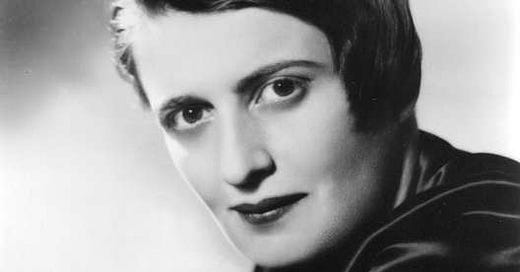


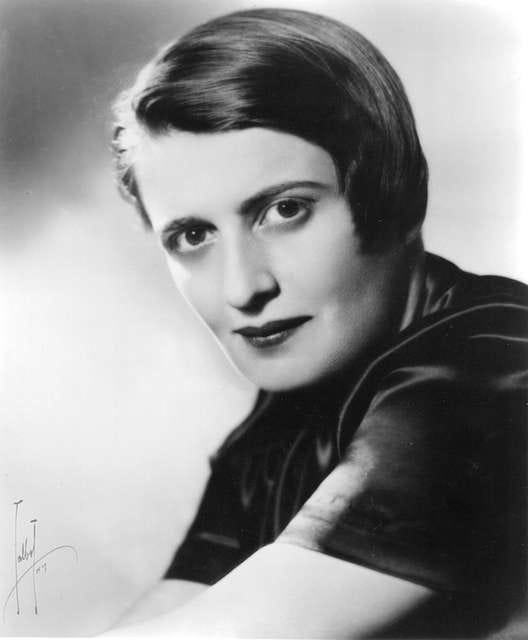

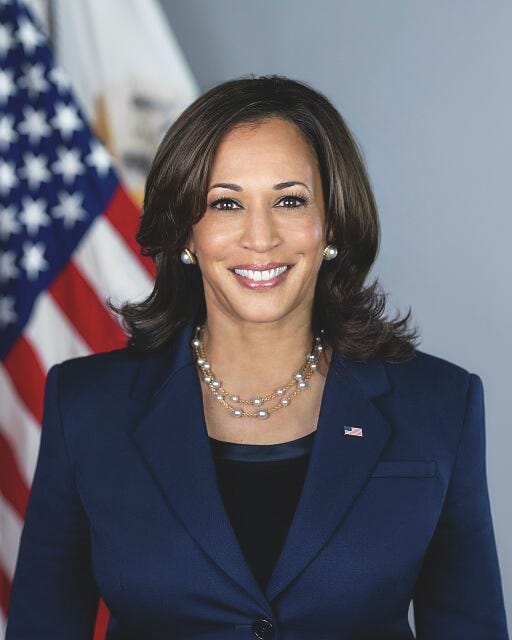





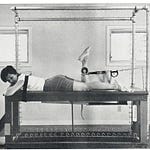




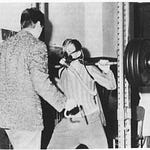


Share this post